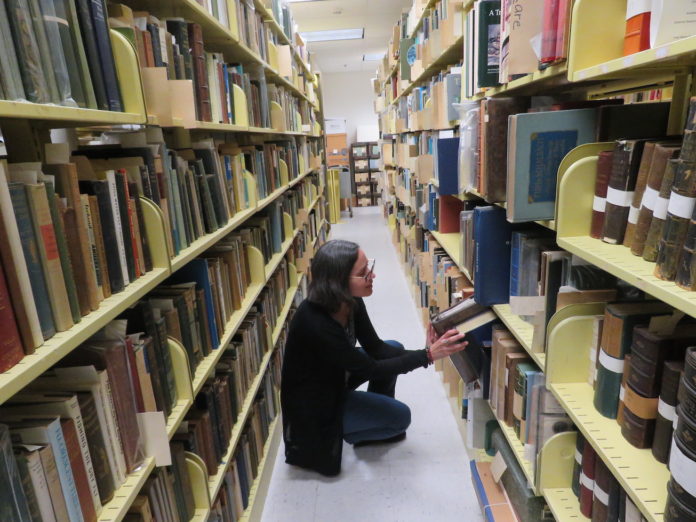Exploring the CSUF Library’s Special Collections
Did you know that California appeared as an island on maps drawn from the journeys of early explorers? Thirteen maps dating from 1587 to 1761 show this startling misconception and can be found in the Pollak Library at Cal State Fullerton, all of them part of the Roy V. Boswell Collections for the History of Cartography. One of these maps even depicts California as a peninsula.
Map from the Roy V. Boswell Collections for the History of Cartography showing California as an island.
Boswell, working with Cal State Fullerton’s founding librarian Ernest Toy, developed a collection of 562 maps of Mexico, Canada, and United States from their earliest beginnings until the 19th century. In addition to the Western Hemisphere maps, there are 359 maps of Europe through the centuries showing the fluidity of political boundaries and the growth of city-states; 129 of Asia; and 145 maps of the entire world as depicted through 400 years of exploration.
Not only do these antique maps have historical value, but the artwork surrounding the edges of early maps depicting mythical and imaginary sea creatures add charm, amusement, and wonder for today’s viewers. Through the generosity of Cal State’s first community support group, Patrons of the Library, Boswell’s collection grew in size and found its on-campus home in 1971. It remains the finest cartography collection in the Cal State University’s system.
Another treasure found in the Pollak Library’s Special Collections emanates from another century. In the mid-twentieth century as science fiction grew in popularity and status, Emeritus professor Willis McNelly created a course for the study of this literary genre. In doing so, he forged friendships with such luminaries as Ray Bradbury, Frank Herbert, and Philip K. Dick. The Pollak Library has typescripts of the first and second revisions of Bradbury’s Fahrenheit 451, and it has one of the largest collections of typescripts, notes and revisions of P.K. Dick’s work that can be found in any university library.

Display regarding Frank Herbert’s Dune.
Herbert’s Dune, to be released as a film this fall, was published in 1965 and broke new ground as the first science fiction novel to become a best seller. Also prescient in his subject matter, Herbert brought attention to the importance of ecological concerns in our lives. Because of his friendship with Professor McNelly, Herbert came to the CSUF campus in 1970, visiting and lecturing in classes. He subsequently donated working papers, drafts, and typescripts for Dune and its sequels in various stages of production to the library’s growing science fiction collection. Currently, visitors to the third floor of the Pollak Library can view the artwork of Art Professor Cliff Cramp’s students as they interpret material from the novel Dune.
Special Collections Librarian Patrisia Prestinary tells us that the Science Fiction Collection also contains scripts of the original 1966-69 “Star Trek” TV series. She says that researchers from around the world visit the science fiction collection in the Pollak Library for its unique holdings.

Researchers from around the world visit the science fiction collection in the Pollak Library for its unique holdings.
Staying within the 20th century and moving into the 21st century, the Freedom Center within Special Collections contains material from different political perspectives reflecting divergent views from the “far right” and the “far left.” From the John Birch Society to Angela Davis, articles appear in newspapers, campaign materials, newsletters, books, pamphlets, videos, flyers, and posters depicting liberal and conservative viewpoints. Also, some items have a more historical interest, especially the Cameron Stewart Collection about the Lincoln Brigade during the Spanish Civil War.

The Freedom Center within Special Collections contains material from different political perspectives reflecting divergent views from the “far right” and the “far left.”
If fly-fishing is your interest, the Kerridge Angling Collection not only contains volumes with printed instructions, but it has bound books that contain actual lures made by sports fishermen and protected with three-dimensional plastic coverings. Viewers can see firsthand the real materials that were found in natural settings and tied with delicacy and imagination.

The Kerridge Angling Collection.
From fishing to theater, the Pollak Library was the lucky recipient of theatrical materials donated by the former Director of the Pasadena Playhouse, Fairfax Proudfit Walkup. A friend of our own Dr. James Young, chair of the CSUF drama Department, Walkup was happy to donate her more-than 2000 volumes of theater history containing detailed pictures of costumes through the centuries and 600 dolls dressed in costumes representing characters in famous plays.
The Local History section of the Pollak Library’s Special Collections contains books, photographs, maps, correspondence, posters and pamphlets about the Japanese-American internment camps in California as well as the growth of the citrus industry.

Special Collections Librarian Patrisia Prestinary.
To view first-hand any of these collections, Fullerton residents can visit www.library.fullerton.edu/services/special-collections.php for contact information and hours.
If you are interested in becoming more active in your support of Special Collections, you can contribute by joining Patrons of the Library at Cal State Fullerton, who have helped acquire and maintain many of the not-so-hidden treasures on the third floor of the Pollak Library. To join Patrons, visit www.library.fullerton.edu and select the Patrons logo. You will be given a choice.
You can apply online or apply by mail.
Related
———————————————————————————————————————————————————————————
Protect local journalism – please subscribe to the print edition of the Fullerton Observer. Our online edition is free, but we depend on print subscriptions from readers. Annual subscription is only $35/year. It only takes a minute – Click Here To Subscribe. Thank you for your support for the Fullerton Observer. Click here to view a copy of the print edition.
———————————————————————————————————————————————————————————
Credit: Source link































